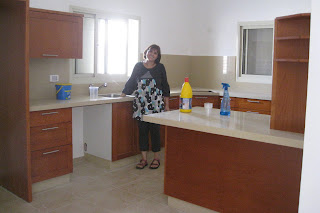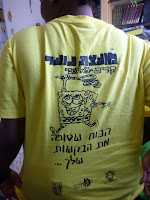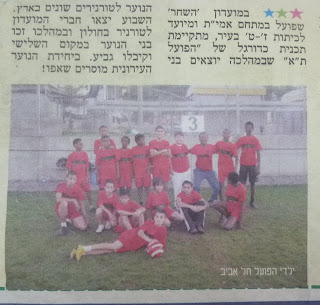1) The city of Kiryat Malachi continues to upgrade the way the city looks. We see street sweepers at least twice a week go by our apartment.
The roundabout at the intersection of Ben Gurion and Jabotinsky really looks lovely, with a mature olive tree in the center and a bubbling fountain too.
There are signs of construction in town:
2) We are amazed at the building of new roads and improving old ones. We found out that one reason there is a huge push to improve roads in the south of the country is that the army will be moving its basic training location from the center of the country and some parts further north to the south, in the greater Beersheva area.
 |
| Expanding road outsdide of Beersheva |
There is a new train line that will go to Beersheva and a lot of improvement is going into the roads there. Highway 6, the toll road, last year opened its branch from the Ashdod/Ashkelon exit southward. There is no toll on that part of the highway as the government built it and not private industry as the volume might not have been big enough for profit, but it was needed because of the army shift and to encourage more people to move into that area.
3) This past week, Israelis were shocked by the deaths of 4 pilots and 3 other air force officers in helicopter training exercise in Romania. http://www.ynetnews.com/articles/0,7340,L-3927326,00.html The helicopter is huge, and could carry 50, but they only allow up to 20 in one after 50+ were killed years ago in a training exercise. After the names of the dead were announced, the daily national newspaper Maariv dedicated one page for each of those who died in the crash.
4) Some of the people who left Gush Katif and moved into temporary housing 5 years ago north of Ashkelon are now moving into their permanent homes. We visited with the librarian at Nitzan, Ayala.
 |
| Ayala on right at work |
 |
| Ayala in her new kitchen |
5) Here are a few signs that we would not see in our communities in the US:
 |
| No entrance on holidays and Shabbat |
 |
Beware of Camel Crossing near Mamshit--also visual signs with picture of camel |
 |
| Street signs in 3 languages, Hebrew, Arabic, and English The letter "Q" not followed by a "U" |
This is one of the few signs in the area pointing toward Kiryat Malachi. It is about 7 miles from town.
6) Friday night we were invited to friends for dinner and we offered to bring a bottle of wine. Suddenly at 3 p.m. I remembered to buy it and rushed to the supermarket across the street. I was afraid that it had already closed, but I was assured by the guard on duty that the store would stay open until 3:30 p.m. Most of the other businesses in town usually close before that on Friday afternoon and stay closed until Saturday night or Sunday morning, the start of the week. Here is a picture I took in front of our apartment at 5:30 Friday afternoon. The usually busy streets were empty, as you can see.
7) Plastic and glass bottles are the main items recycled by residents in towns. Large plastic bottles (a liter or more) are collected in huge bins, while smaller plastic and glass bottles can be returned to supermarkets for 30 agorot each (approximately 8 cents US).
8) One day I went to buy 1% milk. When Howard took a drink, he wondered if something were wrong with the milk. I looked carefully at the container and realized that it was a milk "drink" with sugar added....and yes, it was 1%--lower fat but added sugar. Phoey!
9) Bread is the staple of life, so for many people it is hard to throw away. In the US we often freeze it for stuffing or make bread crumbs from it. Many Israelis don't like to throw it away either, so they often put it next to the community garbage can or in other conspicuous places. Here are two of my favorite ones:
 |
| Bread on a fence post |
 |
| A crow pecking at a bag of bread on top of the plastic bottle recycling cage |
10) Driving in Jerusalem is an experience that we don't want to do very often. Even Dalia Burgana has told me that when she has to go to Jerusalem, she drives just inside the city and then takes a cab to where she has to go. We drove in Jerusalem last Thursday to get to Har (Mount) Herzl and then to visit some cousins in Katamon (now called Gonen). It was definitely harrowing. Twice Howard made u turns where they were not allowed. If he hadn't we might not have been able to turn around for a long time. There is a lot of traffic, many hills, huge intersections, new one-way streets, a lack of numbers of buildings, often a lack of street signs, and crazy drivers. What more can I add!













































